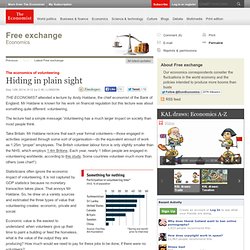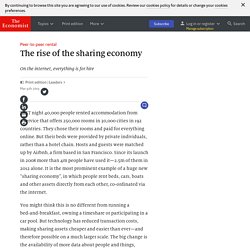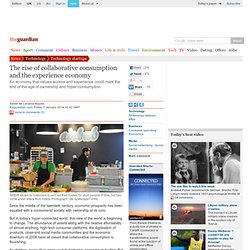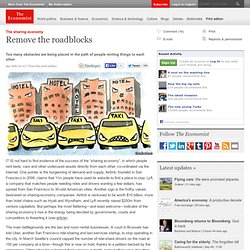

The economics of volunteering: Hiding in plain sight. THE ECONOMIST attended a lecture by Andy Haldane, the chief economist of the Bank of England.

Mr Haldane is known for his work on financial regulation but this lecture was about something quite different: volunteering. The lecture had a simple message. Volunteering has a much larger impact on society than most people think. Take Britain. Mr Haldane reckons that each year formal volunteers—those engaged in activities organised through some sort of organisation—do the equivalent amount of work as 1.25m “proper” employees. BlaBlaCar is to car hire what AirBnB is to the hotel industry. With only three days until Christmas in 2003, Frédéric Mazzella was under pressure to get to his family home in Fontenay-le-Comte, 300 miles outside Paris – but all the trains were full.

After eventually getting a lift from his sister, he noticed most of the cars on the road were empty but for the driver. This was a vast inefficiency in his eyes – but one that got him thinking. "The idea was to organise all the available seats in cars just like we organise all the available seats in planes and trains, with a real search engine, and this did not exist. There was only demand and no offer and organised in a very weird way in that you would have neighbours who would share a ride but you did not know where they were going and when," he says. Rise Of The Renting And Sharing Economy. Smart mobs. Les premiers signes d’un changement à venir m’apparurent lors d’une après-midi de printemps 2000.

Au moment où je me rendis compte que les gens dans les rues de Tokyo fixaient leurs téléphones portables plutôt que d’y parler. Être témoin de ce comportement, maintenant communément répandu dans la plus grande partie du monde, renforça un sentiment que j’avais éprouvé plusieurs fois auparavant – la prise de conscience qu’une technologie est sur le point de changer ma vie d’une façon à peine imaginable. Depuis, la coutume d’échanger de courts messages écrits via le téléphone portable a contribué à l’explosion de subcultures en Europe et en Asie.
Un gouvernement au moins a été renversé en partie grâce à la façon dont les gens se sont servis des textos. Les rituels qui rapprochent les adolescents, engendrent l’activisme politique, et créent les styles de management d’entreprise, se sont transformés de façons inattendues. Ce fut l’Internet mobile qui fit son apparition. Peer-to-peer rental: The rise of the sharing economy. LAST night 40,000 people rented accommodation from a service that offers 250,000 rooms in 30,000 cities in 192 countries.

They chose their rooms and paid for everything online. But their beds were provided by private individuals, rather than a hotel chain. Hosts and guests were matched up by Airbnb, a firm based in San Francisco. Since its launch in 2008 more than 4m people have used it—2.5m of them in 2012 alone. It is the most prominent example of a huge new “sharing economy”, in which people rent beds, cars, boats and other assets directly from each other, co-ordinated via the internet. You might think this is no different from running a bed-and-breakfast, owning a timeshare or participating in a car pool. What’s mine is yours, for a fee Just as peer-to-peer businesses like eBay allow anyone to become a retailer, sharing sites let individuals act as an ad hoc taxi service, car-hire firm or boutique hotel as and when it suits them. Peering into the future. The sharing economy: Boom and backlash. The rise of collaborative consumption and the experience economy.
Since the middle of the twentieth century, economic prosperity has been equated with a consumerist society with ownership at its core.

But in today’s hyper-connected world, this view of the world is beginning to change. The abundance of assets along with the relative affordability of almost anything, high-tech consumer platforms, the digitisation of products, close-knit social media communities and the economic downturn of 2008 have all meant that collaborative consumption is flourishing. As children, many of us were used to bartering, swapping or trading. But these networks are now wired up globally, so this kind of networking and exchanging is second nature, even between strangers and across myriad commodities. The sharing economy: Remove the roadblocks. IT IS not hard to find evidence of the success of the “sharing economy”, in which people rent beds, cars and other underused assets directly from each other, co-ordinated via the internet.

One pointer is the burgeoning of demand and supply. Airbnb, founded in San Francisco in 2008, claims that 11m people have used its website to find a place to stay. Lyft, a company that matches people needing rides and drivers wanting a few dollars, has spread from San Francisco to 30-odd American cities. Another sign is the frothy values bestowed on sharing-economy companies: Airbnb is reckoned to be worth $10 billion, more than hotel chains such as Hyatt and Wyndham, and Lyft recently raised $250m from venture capitalists.